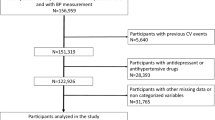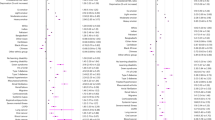Abstract
Numerous epidemiological studies have shown that alcohol and tobacco consumption are the main risk factors for oesophageal cancer in Western countries. In these studies, the consumption of both alcohol and tobacco has almost always been measured as current mean intake. The present case-control study investigates the association between alcohol and tobacco consumption and the risk of oesophageal cancer by assessing exposure as total lifetime intake, mean weekly intake, duration of consumption and former and current consumption. Between 1991 and 1994, 208 cases and 399 control subjects were selected from three French university hospitals (Caen, Dijon and Toulouse). Eligible cases were men aged less than 85 years admitted to one of these hospitals with histologically proven squamous cell carcinoma of the oesophagus. During the interview, complete tobacco and alcohol consumption histories were recorded. Our findings suggest that alcohol consumption and tobacco consumption influence the risk of oesophageal cancer in different ways. In the case of alcohol, the relationship between the odds ratio and mean weekly intake was linear, the risk depending solely on mean weekly intake, with former and current consumption having similar effects. With regard to tobacco, the relationship between the odds ratio and mean weekly intake was log-linear; the risk depended mainly on the duration of consumption and former consumption had a lesser effect than current consumption. Our study suggests that total lifetime intake is not a correct measure of exposure for either alcohol or tobacco: for a given lifetime consumption of tobacco, a moderate intake during a long period carries a higher risk than a high intake during a shorter period and, conversely, for a given lifetime consumption of alcohol, a high intake during a shorter period carries a higher risk than a moderate intake during a longer period. Our results confirm the very low risk associated with a low alcohol intake, even over long periods. In contrast, there is a steep increase in the risk associated with smoking at even low mean intakes if these are continued over long periods. Our findings also suggest that even heavy smokers may benefit from quitting.
This is a preview of subscription content, access via your institution
Access options
Subscribe to this journal
Receive 24 print issues and online access
$259.00 per year
only $10.79 per issue
Buy this article
- Purchase on Springer Link
- Instant access to full article PDF
Prices may be subject to local taxes which are calculated during checkout
Similar content being viewed by others
Author information
Authors and Affiliations
Rights and permissions
About this article
Cite this article
Launoy, G., Milan, C., Faivre, J. et al. Alcohol, tobacco and oesophageal cancer: effects of the duration of consumption, mean intake and current and former consumption. Br J Cancer 75, 1389–1396 (1997). https://doi.org/10.1038/bjc.1997.236
Issue Date:
DOI: https://doi.org/10.1038/bjc.1997.236
This article is cited by
-
Decreased risk of esophageal cancer owing to cigarette and alcohol cessation in smokers and drinkers: a systematic review and meta-analysis
Esophagus (2017)
-
XPD Lys751Gln polymorphism and esophageal cancer susceptibility: a meta-analysis of case–control studies
Molecular Biology Reports (2012)
-
Smoking and alcohol drinking increased the risk of esophageal cancer among Chinese men but not women in a high-risk population
Cancer Causes & Control (2011)
-
Lack of association between XPG Asp1104His and XPF Arg415Gln polymorphism and breast cancer risk: a meta-analysis of case–control studies
Breast Cancer Research and Treatment (2011)
-
Alcohol drinking, cigarette smoking, and the development of squamous cell carcinoma of the esophagus: epidemiology, clinical findings, and prevention
International Journal of Clinical Oncology (2010)



